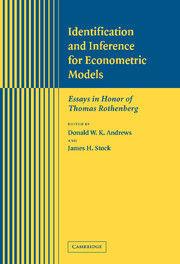Book contents
- Frontmatter
- Contents
- List of Contributors
- Preface
- Part I Identification and Efficient Estimation
- Part II Asymptotic Approximations
- 8 Asymptotic Expansions for Some Semiparametric Program Evaluation Estimators
- 9 Higher-order Improvements of the Parametric Bootstrap for Markov Processes
- 10 The Performance of Empirical Likelihood and Its Generalizations
- 11 Asymptotic Bias for GMM and GEL Estimators with Estimated Nuisance Parameters
- 12 Empirical Evidence Concerning the Finite Sample Performance of EL-type Structural Equation Estimation and Inference Methods
- 13 How Accurate is the Asymptotic Approximation to the Distribution of Realised Variance?
- 14 Testing the Semiparametric Box–Cox Model with the Bootstrap
- Part III Inference Involving Potentially Nonstationary Time Series
- Part IV Nonparametric and Semiparametric Inference
10 - The Performance of Empirical Likelihood and Its Generalizations
Published online by Cambridge University Press: 24 February 2010
- Frontmatter
- Contents
- List of Contributors
- Preface
- Part I Identification and Efficient Estimation
- Part II Asymptotic Approximations
- 8 Asymptotic Expansions for Some Semiparametric Program Evaluation Estimators
- 9 Higher-order Improvements of the Parametric Bootstrap for Markov Processes
- 10 The Performance of Empirical Likelihood and Its Generalizations
- 11 Asymptotic Bias for GMM and GEL Estimators with Estimated Nuisance Parameters
- 12 Empirical Evidence Concerning the Finite Sample Performance of EL-type Structural Equation Estimation and Inference Methods
- 13 How Accurate is the Asymptotic Approximation to the Distribution of Realised Variance?
- 14 Testing the Semiparametric Box–Cox Model with the Bootstrap
- Part III Inference Involving Potentially Nonstationary Time Series
- Part IV Nonparametric and Semiparametric Inference
Summary
ABSTRACT
We calculate higher-order asymptotic biases and mean squared errors (MSE) for a simple model with a sequence of moment conditions. In this setup, generalized empirical likelihood (GEL) and infeasible optimal GMM (OGMM) have the same higher-order biases, with GEL apparently having an MSE that exceeds OGMM's by an additional term of order (M – 1)/N, i.e., the degree of overidentification divided by sample size. In contrast, any two-step GMM estimator has an additional bias relative to OGMM of order (M – 1)/N and an additional MSE of order (M – 1)2/N. Consequently, GEL must be expected to dominate two-step GMM. In our simple model all GEL's have equivalent next higher order behavior because generalized third moments of moment conditions are assumed to be zero; we explore, in further analysis and simulations, the implications of dropping this assumption.
INTRODUCTION
This paper has two parts. In the first part, we calculate higher-order asymptotic biases and mean squared errors (MSE) for a simple model with a sequence of moment conditions. In this setup, generalized empirical likelihood (GEL) and infeasible optimal GMM (OGMM) have the same higher-order biases, with GEL having an MSE that apparently exceeds OGMM's by an additional term of order (M − 1)/N, i.e., the degree of overidentification divided by sample size. In contrast, any two-step GMM estimator has an additional bias relative to OGMM of order (M − 1)/N and an additional MSE of order (M − 1)2/N.
Information
- Type
- Chapter
- Information
- Identification and Inference for Econometric ModelsEssays in Honor of Thomas Rothenberg, pp. 216 - 244Publisher: Cambridge University PressPrint publication year: 2005
Accessibility standard: Unknown
Why this information is here
This section outlines the accessibility features of this content - including support for screen readers, full keyboard navigation and high-contrast display options. This may not be relevant for you.Accessibility Information
- 1
- Cited by
